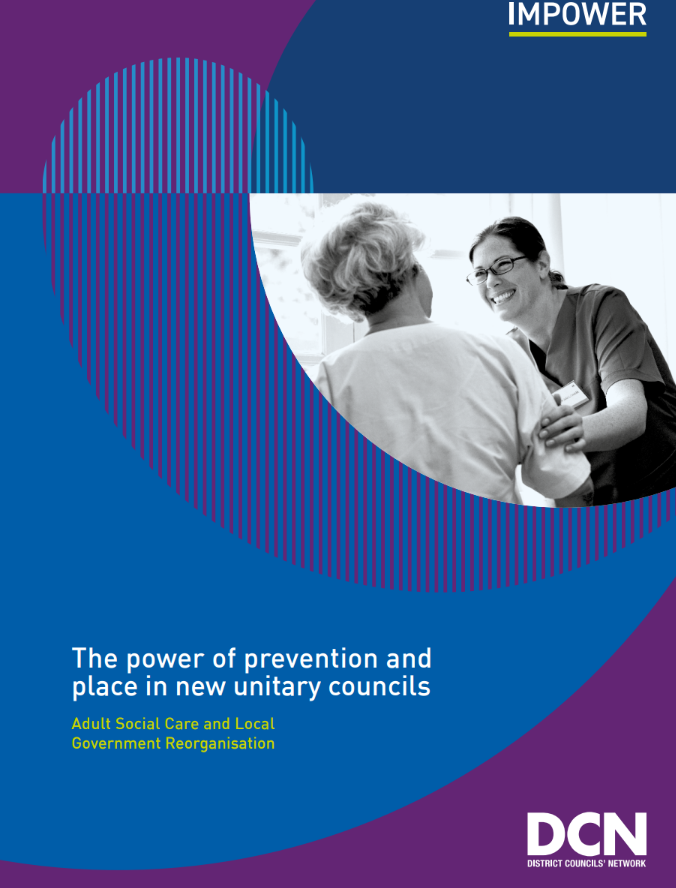Proposals to disaggregate adult social care services could spur prevention focus.
District councils’ local connection gives them a “prevention superpower” which must be harnessed when new unitary authorities are formed, a new report has said.
The report by IMPOWER offers insights and tools to help district councils develop proposals to reorganise local government, potentially entailing the disaggregation of existing county council adult social care services.
Local government reorganisation (LGR) has been instigated by the Government in all two-tier areas of English local government. It will merge 164 district and 21 county councils to form new unitary authorities. The District Councils’ Network, which commissioned the report, has urged that new councils remain close to communities and that LGR spurs ambitious public service reform – including by removing barriers between social care and NHS services.
IMPOWER’S report says disaggregating adult social care departments can be done effectively, with early planning, strong leadership and realism required to make it work. The prize disaggregation offers is a “chance to reset” services, it says. “Done well, it may allow systems to better reflect the geographies of communities and care markets.”
It describes districts as “essential partners in adult social care reform” and notes their existing leading role in prevention, housing, welfare and community support, which are “critical to the sustainability of care systems”.
“Local connection is a prevention superpower,” the report continues. “Districts’ ability to build trust and respond to local context gives them a critical role in early intervention and community-based support. New unitary authorities should preserve and build on this capability through layered, place-based models of delivery.”
The study dismisses concerns that smaller social care departments are bound to be less effective. IMPOWER’s analysis shows “there is no clear link between scale and overall quality of adult social care”. It notes that there are “no economies of scale in delivering personal care”, while larger systems sometimes “introduce diseconomies”.
“District councils should approach reform with confidence and curiosity,” the report says. “Their insight into communities, assets and local risks makes them well placed to contribute to stronger, more preventative and more accountable care systems — if they are engaged early and constructively in shaping future models.”
In response to the report, Cllr Hannah Dalton, health spokesperson for the District Councils’ Network, said:
“This report highlights that district councils have much to bring to the table in designing the future of adult social care – in particular, our unrivalled links our communities and our unwavering focus on prevention.
“District councils are specialists in adapting housing to ensure older people can remain independent for longer, running planning systems that encourage development to boost physical activity and overseeing wellbeing programmes to tackle obesity or mental illness. Following reorganisation, this work should be enhanced to complement and support more traditional social care work.
“Reorganisation should inject a strong sense of place into adult social care services – tailoring them to the unique needs of communities – and it must bring about a greater focus on prevention, which is the only way we can hope to tackle rising demand.
“This is where smaller councils have a natural advantage – with a localised focus on communities and close knowledge of their people and places. These attributes should be essential ingredients of redesigned and reimagined social care services.
“IMPOWER’s report confirms district councils should be confident to use their unique attributes to devise new approaches for adult social care. Services cannot go on as they are, with demand rising faster than budgets, unmet needs and low wages. It would be a mistake to simply carry forward the existing failing model at a wider scale, when a shift in approach towards prevention is desperately required.”
Sean Hanson, Chief Executive of IMPOWER Consulting, said:
“Reorganisation is not easy. Navigating disaggregation, establishing safe transitions, and designing new delivery models will test even the most experienced leaders.
“But it also creates a once-in-a-generation opportunity to reset the system: to hardwire prevention into your local offer, to embed housing and community support into commissioning strategies, and to build ASC services that reflect the unique needs and strengths of local people.”
The full report can be read here.






